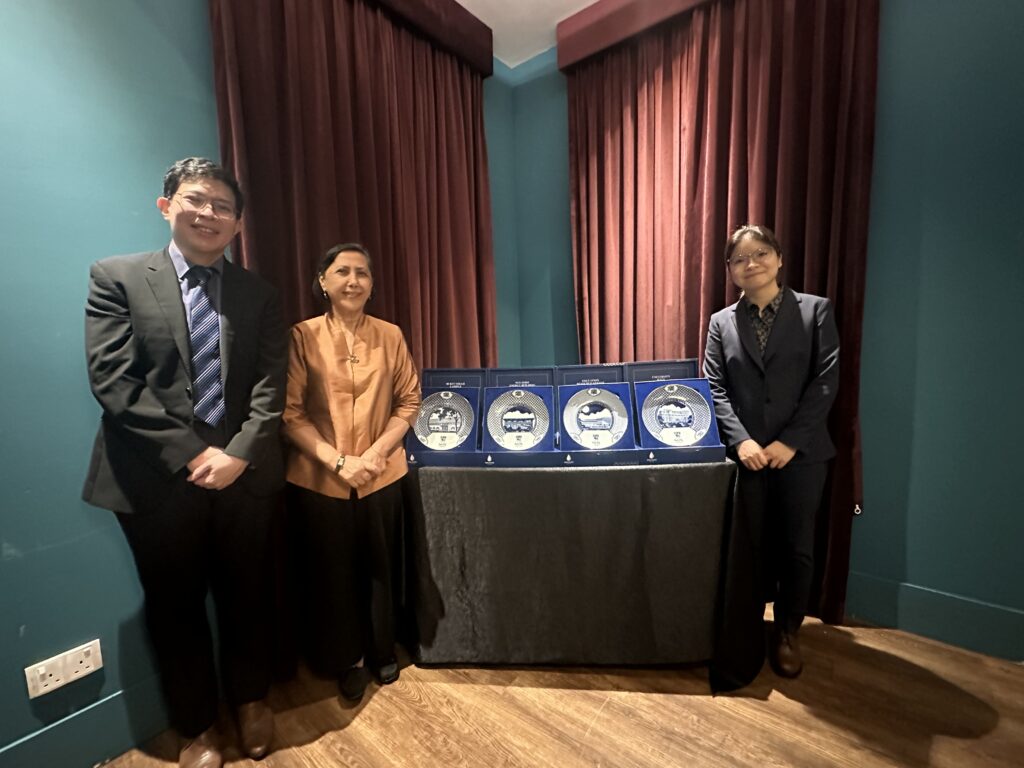NUS Receives Philanthropic Gift to Advance Healthy Longevity Initiatives in the Health District @ Queenstown
June 13, 2024
IN BRIEF | 10 min read
- The newly established Gloria Lee Woo Award will start with supporting initiatives focused on mental and social wellbeing and Malay female caregivers.
The National University of Singapore (NUS) has received a gift from the family of the late Mrs Gloria Lee Woo, founder of stock brokerage Kim Eng Holdings, towards the Health District @ Queenstown (HD@QT).
HD@QT is a multi-stakeholder, whole-of-society endeavour spearheaded by NUS, the National University Health System and the Housing & Development Board, to increase healthy longevity, enable purposeful longevity, promote intergenerational bonding, and support a community of all ages.
The gift was made by Mr Douglas Ooi, Mr Ronald Ooi, and Ms Carole Ooi to honour their late mother, Mrs Gloria Lee Woo. In appreciation of their generosity, NUS has established the Gloria Lee Woo Award, which was formalised at an appreciation luncheon held on 12 June 2024. The Award aims to provide important seed funding for research projects in HD@QT.

The first Awards will support three projects in the HD@QT: the development of an intergenerational programme to improve mental and social health in adolescents, adults in the sandwich generation, and older adults; to understand the challenges of Malay women caregivers in the sandwich generation and from low-income families as well as the factors that impede their access to health services and support; and investigating the impact of labour market engagement on retirees’ socioeconomic, physical, and mental well-being.
Professor Liu Bin, NUS Deputy President (Research and Technology), said, “We are deeply grateful for the philanthropic gift from Mr Douglas Ooi, Mr Ronald Ooi, and Ms Carole Ooi. Their gesture is a significant boost for the forward-thinking projects undertaken by the Health District @ Queenstown. This support enables us to seed fund new research endeavours which can potentially attract more competitive grants and be scaled for greater future impact.”
“Our mother was deeply committed to the wellbeing of others. In her memory, we chose to support the impactful initiatives at the Health District @ Queenstown. This gift is our way of giving back to Singapore and ensuring her legacy lives on and continues to benefit future generations, and we hope to be able to support this meaningful project at Queenstown in years to come,” shared Mr Douglas Ooi.
“This gift by Mr Douglas Ooi, Mr Ronald Ooi, and Ms Carole Ooi is testament to the generosity of Singaporeans in developing programmes to enhance the lives of the residents of Singapore. We are honoured by the trust they have placed in the vision of the Health District @ Queenstown in shaping a better Singapore,” commented Professor John Wong, Executive Director of the NUS Centre for Population Health, and Co-Chair of the HD@QT Steering Committee.
Intergenerational programme for wellness building
Assistant Professor Cyrus Ho, who holds a joint appointment in the Department of Psychological Medicine at the NUS Yong Loo Lin School of Medicine and the Department of Psychological Medicine at the National University Hospital, will be leading the development of an intergenerational programme to address the underlying psychological and emotional factors contributing to mental resilience in individuals across various life stages – older persons, adolescents, and adults.
During the 12-week programme, 30 adolescents will be paired up with 30 older persons and 30 adults in the sandwich generation to engage in various activities such as arts and crafts, storytelling, park exercises and gardening. By assessing the effectiveness of the different approaches, Asst Prof Ho and his multidisciplinary team hope to develop effective interventions to improve the mental and social health of the participants by targeting areas such as psycho-social behaviour, lifestyle, help-seeking behaviour, and economical assessment.
The project, which will be conducted in collaboration with schools, elder care centres and senior activity centres, will commence in July 2024 and is expected to be completed by June 2025.
Health needs and access to services among sandwich generation Malay women caregivers from low-income families
Led by Associate Professor Noor Aisha Abdul Rahman from the Social Service Research Centre and the Department of Malay Studies at the NUS Faculty of Arts and Social Sciences, this pilot study seeks to understand the challenges and needs of Malay female caregivers from low-income families who are in the sandwich generation.
By understanding their needs and the factors that impede their access to health and support services, early interventions can be designed to facilitate their participation in health services and programmes to mitigate their own health challenges and improve their wellbeing. This, in turn, will help enhance the quality of their caregiving for their elderly care recipients.
This qualitative study will involve 40 Malay female caregivers between 40 and 60 years old who are living in Queenstown and social service providers with relevant knowledge and experience working with this generation of caregivers. The study is expected to commence in June 2024 and be completed by December 2025.
Healthy and fulfilling ageing through micro jobs
Research shows that retirement or separation from the labour market may influence mental and physical health. Assistant Professor Shan Xiaoyue from the Department of Economics at the NUS Faculty of Arts and Social Sciences, together with Professor Uri Gneezy, visiting professor at the NUS Yong Loo Lin School of Medicine, will be conducting a study to investigate the impact of labour market engagement – such as taking on part-time work – on the senior population’s socioeconomic, physical, and mental wellbeing after retirement.
About 250 participants who are above the age of 50 and living in Queenstown will be recruited for this project, which will commence in July 2024. Over a 12-week period, the project will provide participants with part-time work at different intensities and monitor their wellbeing along various dimensions, such as physical health, mental health, cognition, sleep quality, happiness levels, quality of relationships with family, and sense of financial security. A follow-up survey will be conducted about three months after the end of the study.
This project will provide an understanding of the short-term and long-term impact of micro jobs on the well-being of older persons.

A healthy town for all
These three programmes, which will involve residents in HD@QT as well as stakeholders from across society, contribute towards the development of effective, scalable and sustainable interventions to achieve the goals of HD@QT. Sustainable and successful implementation of these programmes in HD@QT could lead to similar programmes being adopted across Singapore.
This story first appeared in NUSNews on 12 June 2024.

